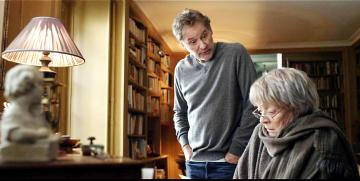'My Old Lady' charming at times but slips into melodrama
By Barry Paris / Pittsburgh Post-Gazette
“I was born with a silver knife in my back,” says Mathias Gold, with an abundance of self-pity. But there’s an absence of gold and silver alike in his bank account, which is why he’s in Paris: He just inherited a valuable apartment there (in the 10 million euro range) from his estranged father and has come to claim and cash it in.
Convincingly played by Kevin Kline in “My Old Lady,” our American in Paris is a ne’er-do-well who has ne’er done well with females or finance. He has three divorces, one for each of his unpublished novels. He’s not what you’d call charming — tactless, actually. He speaks no French. He’s in a hurry to get in and get (money) out.
To his pleasant surprise, this windfall property comes with a beautiful old garden attached. To his less pleasant surprise, it also comes attached with aged Mathilde Girard (Maggie Smith) and her daughter Chloe (Kristin Scott Thomas), who have lived there for decades and have no intention — or obligation — to leave.
'My Old Lady' movie trailer
n American inherits an apartment in Paris that comes with an unexpected resident.
Are you interested in ancient French real estate law? Neither was Mathias until now, upon discovering something called en viager, a property-buying statute left over from Napoleonic days. It’s a kind of reverse-mortgage “equity release” and lifetime annuity plan by which the seller-occupant gets a monthly payment and the right to stay for life, in exchange for a big discount in the selling price. The buyer-owner must wait for the occupant to die before he can recover it — and, in this case, pay Mme. Girard 2400 euros a month for the privilege.
The old lady is thus comfortably “grandmothered” in, while the new Yankee owner is relegated to her late husband’s hunting-trophy room and left to fuss and fume with her imperious daughter, who is equally furious about the whole arrangement. There are plenty of secrets to be ferreted out as the characters exchange bits and pieces of (highly redacted) biographical information in the course of their residential war.
Seems that Mathilde had a relationship with Mathias’ unlamented father that increased the misery of his much-lamented mother. (Mathilde, a jazz lover, also had a fling with Django Reinhardt — which leads Mathias to ask her if she ever met Sigmund Freud.) Nowadays, she barters English lessons for her doctor bills and mayonnaise, and declares, “Precision is the key to a long life — precision and wine.” At 92, she’s depressingly healthy from his viewpoint. At 57, he’s depressingly aimless from hers.
“How do you get to be 57 and have nothing to show for it?” she inquires.
What initially appears to be a comedy of errors evolves into a darker, angrier, more emotional tale as the melodramatic revelations and arguments about marital morality intensify its second act. “Your father was right — you drink too much and you have no self-esteem,” says Mathilde. “Your father was generous to a fault.”
“To YOU!” Mathias rages in reply.
This is director-writer Israel Horovitz’s feature film debut, based on his own three-character play of 2002. No surprise that his direction is stagy and that — despite a few nice exteriors in Paris’ popular Marais district — the camera seems as stuck in their dimly lit apartment as Mathias and the Girards.
The performances significantly (but not fully) compensate. Mr. Kline is soulful and affecting (except for a couple of over-the-top drunk soliloquies) in what might better have been a Robin Williams part. And Maggie Smith — sans wig, makeup and mannerisms — is admirably restrained.
Kristin Scott Thomas is a delight to rediscover. She has not done many films since her Oscar-nominated role in “The English Patient” (1996), subsequently living and working in France. She was terrific in the John Lennon biopic “Nowhere Boy” and in the powerful French post-prison drama “I’ve Loved You So Long” (both 2009). In that latter picture, and here, she speaks fluent French.
(“People will now go to films with subtitles, you know,” she said in a recent interview. “They're not afraid of them. It's one of the upsides of text messaging. Maybe the only good thing to come of it.”)
“My Old Lady” has charming moments and sentimental redemption but, as it gets soapier, resembles a pity party for people cursed by their parents. C’est la vie.
Also c’est la vie is that charmingly French, high-risk real estate scheme in which neither buyer nor seller knows how long those annuity payments will continue. A true cautionary news story: Under that arrangement, in 1965, a French speculator bought an expensive apartment in southern France from a certain Jeanne Calment, then 89. She outlived both the purchaser and his widow, who had to make payments for 32 years until Mme Calment departed in 1997 at the age of 122.
Post-Gazette film critic emeritus Barry Paris can be reached at parispg48@aol.com.





